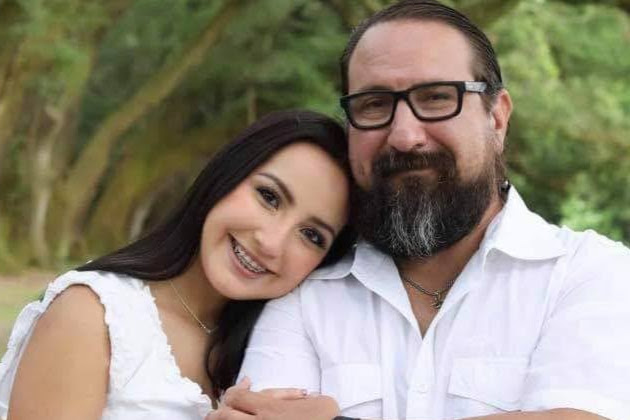RYAN UGALDE
It is with heavy sorrow that we announce that Ryan Ugalde lost his battle with pancreatic cancer on March 11, 2024. Our condolences to his family and friends. Read his original Warrior Story below.
The Marines Prepared Him For The Battle He is Fighting
Written By Julia Brabant
November, 2021
Date of Diagnosis: November 11, 2019
Honor, Courage & Commitment: A Former Marine’s Fight Against Pancreatic Cancer
Ryan Ugalde entered the U.S. Marine Corps straight out of high school, but unlike many Marines, his stint in the relatively peaceful mid-90s meant he never experienced actual combat. Fast-forward several decades, and he now realizes that his time in the Marines wasn’t preparing him for combat – it was preparing him for the battle he’s fighting now.
A resident of Old River – Winfree, Texas, Ryan had just gotten home from watching his daughter cheer lead for the local high school football team when Tropical Storm Imelda rolled in, dumping torrential rains and triggering flooding throughout the region. Not wanting to venture back out, he picked up some questionable leftovers, had dinner and went to bed.
When sudden, severe abdominal pain began the next day at work, Ryan figured he’d made a poor dinner choice and went home to bed. Unable to get up for several days, he visited the local emergency room to make sure it was food poisoning, as he suspected. There, doctors told him it likely wasn’t, or his condition would have improved by now.
A scan followed, after which Ryan felt a shift in the room. “Once I came out of that first scan, everything was different,” he said. “Everyone’s demeanor changed.”
The hospital where Ryan had his scans said they lacked the proper equipment for a biopsy and referred him to a larger hospital, where he’d need to wait for a bed. Days passed, and with Ryan on strict no food orders, he began feeling even worse. Frustrated at the lack of urgency or progress, Ryan contacted Dr. George Van Buren at Baylor St. Luke’s Medical Center at the urging of a friend whose mother had been seeing the doctor for pancreatitis.
Once he did so, things started moving quickly. A biopsy and additional testing led to a diagnosis of Stage 2 pancreatic cancer. His medical team, which also included oncologists Dr. Tammaz Armaghany, M.D., and Dr. Benjamin Musher, M.D., started exploring his options, and because he was diagnosed at an earlier stage, he had a couple options. Immediate surgery to remove the tumor was one. The second option was chemotherapy to reduce the size of the tumor followed by surgery. Ryan and his team opted for the latter, thinking it made sense to shrink the tumor and get the medicine flowing in his system before undergoing surgery.
Before he could begin chemo, though, his pain came back even worse than before. It turned out he had a tumor on the tail of his pancreas that had gotten so big it had closed off his small intestine, resulting in a bowel obstruction.
His condition was so severe the doctor had to place a stent to relieve the obstruction.Doctors also had to put in a portacath, which sits under the skin on the chest for the purposes of administering chemotherapy drugs.
“I asked them to put it on the left side, rather than the right,” he said. “It was almost hunting season, and I didn’t want it on my shooting shoulder!”
Chemotherapy Highs & Lows
His doctor obliged, and a week later, he had his first chemo treatment with FOLFIRINOX, a combination of drugs used to treat pancreatic cancer. Things went OK at first, but after the third treatment, he found himself balled up on the floor of his brother’s house on Christmas Eve, experiencing what he called “exorcism-like” convulsions in an involuntary reaction to the medication.
His cousin, a police officer who lived across the street, and his wife, a nurse, came over, and the nurse disconnected and flushed the port while they awaited the ambulance. When the ambulance arrived, it had several firetrucks with it. Realizing the ambulance was taking him to a different hospital than where he’d been undergoing treatment, he asked if they could go to St. Luke’s.
“We can’t pass one hospital on the way for the other,” he recalled the EMT saying. “You might not make it that long.”
That night, in his hospital bed, he had something of a spiritual awakening. “I felt like the devil was trying to come take me,” he said, recalling how he’d grasped his daughter’s hand. “I wasn’t going to let that happen. I told her, “Christmas isn’t going to be the day you remember as the one when your dad passed.”
Since that night, he’s yet to experience the same degree of pain. His doctors did consider taking him off of FOLFIRINOX and replacing it with a different medication, but he recalled his nurse telling him that anyone who completed a full FOLFIRINOX round had a good chance of beating the disease, so he stuck with it.
He continued treatment from the winter of 2019 through May of 2020 – which was also the heart of the COVID-19 pandemic, creating additional challenges.
“You go from having one visitor allowed to none,” he said. “As bad as chemo is, you really want someone to be there with you.”
Ringing the Bell to Signal Remission
In May, Ryan got to “ring the bell” signifying the end of his chemo treatment. His medical team thought it best he have a few months’ rest before undergoing surgery. On June 3, 2020, doctors removed the tail of his pancreas, part of his colon, his spleen, his gallbladder and a spot on his stomach his doctor though looked suspicious. His doctor turned out to be right, with tests confirming that the spot was, in fact, cancerous. It took 33 staples to stitch him back up.
Recovery from the surgery was brutal, but Ryan went into remission the same day he had it. For the next two months, he began feeling stronger and healthier, but then a light cough led to renewed discomfort. He could tell something was amiss, and when he went to the doctor, he learned his coughing had split his internal stitches, resulting in a hernia. This time around, it took 25 staples – and the addition of some mesh made from pig skin – to put Ryan back together.
For the next 11 months, Ryan lived cancer-free, but he did develop diabetes, which he now has to manage. He also found himself fighting anxiety and depression, which had never been issues for him beforehand. Ryan remembered his doctor telling him that pancreatic cancer and depression went hand-in-hand with or without an actual diagnosis because of the hormonal and other changes affecting the body.
Ryan also recalled his doctor asking him if he had a pet.
“A dog just wants to be with you in the moment, as you are,” the doctor had said. “It doesn’t care about tomorrow or yesterday – none of us are guaranteed tomorrow. Anxiety is worrying about the future, and depression, the past. Try to shift your mindset more toward that of a dog.”
A Cancer Recurrence
A routine return-to-work exam in May of 2021 revealed troubling news: Ryan had another tumor on his rectum. Doctors thought it might be an entirely separate type of cancer, but the pancreatic cancer had metastasized to his rectum. Looking back, Ryan thinks this may have contributed to his bout with depression.
“You know your body – when I went into remission and everyone else was in celebration mode, I just wasn’t on the same page. It’s like I knew this fight wasn’t over.”
Ryan is having new chemotherapy treatments every other week to tackle the pancreatic cancer that had spread to his rectal cancer. He’s grateful for the flexibility his medical team has allowed him during this time. When his hometown team, the Houston Astros, made its way to the World Series in October, 2021, and Ryan scored tickets to game two, he asked Dr. Armaghany if he could delay his chemo treatments a week to take his daughter. She consulted Dr. Musher, who acknowledged the importance of maintaining quality of life amid treatment. Together, they gave him the green light, paving the way for an experience Ryan and his daughter won’t soon forget.
It is unclear whether Ryan will need radiation when his chemotherapy treatments end. Now that his hair and beard have grown in, though, he likes to stop and chat with the other patients spending long days in the chemotherapy chairs and tell them that he was there, too, just a few months prior. Sometimes, he’ll even give a glimpse of his cheeky new tattoo – a USB port on his chest.
Ryan also likes to swing by the nurse’s station with donuts to show how grateful he is for the “kind eyes behind the masks” that helped him so much during his darkest days.
An Eye on the Future
As far as the future, Ryan’s team is optimistic. His oncologist even went on to suggest that, at the completion of his current plan, he’d likely be “healed” – a term they don’t throw around lightly.
“I’m about two years into all this, and I’ve had a lot of support along the way – and a lot of survivors mentoring me,” Ryan said. “That’s the kind of person I want to be now.”
Ryan also noted that his care team at St. Luke’s – and his prayer team at home – made all the difference in his journey thus far. He said that his entire circle, from his family, bosses and colleagues at work to total strangers who formed a prayer group for him online, plays a pivotal role in keeping his spirits high and providing the emotional support he feels is as valuable as the medical treatments he receives.
“It takes a village, and mine is a pretty awesome one,” he said. “It sounds kind of cheesy, but in a way, this all has helped reshape my view of humanity. We’ll live in a beautiful world when everyone treats others with the same care and compassion they do cancer patients.”
Ryan shares updates about his treatments and progress via his Facebook page. Updates are also available via the “Prayers for Ryan Ugalde” Facebook page.



